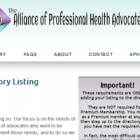This post asks the question: Under what circumstances do we go to the wall for our patient-clients? And when we need to go there, what’s the best approach?
Scenario: Your patient-client checks in for a medical appointment and the receptionist is rude during the process. Do you say or do anything? And if so – how and what?
Scenario: As you sit by your patient’s hospital bedside, a nurse comes in to change a dressing already wearing gloves. You ask her to wash her hands and put on new gloves and she cops an attitude. Do you insist? And if so, how?
Scenario: Your client needs to make a very difficult medical decision and has asked for your help to weigh the pros and cons, and to uncover additional possibilities. You’ve walked him through all the possibilities – including those the doctor provided, and others you learned about through some research you did on his behalf.
His choice is not the same as the doctor’s recommendation, but when he gets to the appointment with his doctor to share his decision, the doctor tells him he’s making the wrong decision. Clearly uncomfortable, your client begins to back-pedal, to default to what the doctor has recommended. Do you speak up on your patient’s behalf? And if so, where do you start?
As advocates and care managers, we’ve experienced these scenarios and others like them. If one word could summarize the real problem, it’s the R word – RESPECT – and it’s what’s missing from the equation. In all three cases, the provider (or office worker) is showing a lack of respect for your client.
And yes, in all cases, you must stand up for your client.
MUST. Yes, must. Unless you believe your client has done something unethical or life threatening, I believe it’s your duty as the person hired by the client to stand up on behalf of your patient-client. (If they are making unethical or life threatening choices, then you really need to walk away from that client anyway… but I digress….)
Standing up for the client actually seems pretty clear, doesn’t it? Your client has hired you, is paying you, is… your client. But of course… the challenge is in making it happen.
One thing I know about the vast majority of people who choose patient advocacy or care management as a career is that they have hearts of gold. They choose this profession because they are caring individuals. It’s also one reason they are so good at what they do – because they care.
But for many, that also means they are reluctant toe-steppers. Too often, very caring people don’t like confrontation and would rather play nice than challenge another professional. Conflicts like those scenarios described above create a real problem for such caring people. Picking one’s battles is always important; but choosing not to pick them at all won’t work well for advocates or their clients.
So the real question is – how will you manage some of that confrontation to improve the level of respect for your client, your client’s confidence level, and her treatment?
A few ideas:
Begin early in your relationship with your patient. Let him know that there will be times that providers are more focused on themselves and less on him – and that you will be there to stand up for him, to help him command the respect he deserves, that your intent is to be sure he gets the care he needs, and to make sure he gains as much confidence as possible from all encounters with the system.
Warn him that there will be times that may come across as confrontational, but that you will minimize those to the best of your ability. And reiterate to him that your command of his respect will not create bigger problems.
Next up comes Grandma’s advice about catching more flies with honey. Be sweet to the receptionist, ask about the picture of her kids that sits next to her computer, or joke about Dancing with the Stars – or just somehow try to engage her on a whole different plane than her rudeness. Soften her up. Win her over. It may not work, but it’s worth a try and may change her attitude toward your client and you.
Humor is often a great tool, although sometimes difficult or inappropriate to introduce. My friend Elizabeth Cohen at CNN suggests your tell the nurse who is already wearing gloves, or anyone who shows up to treat your hospitalized patient without first washing her hands where you can see her that you are just like Howie Mandel – a germophobe – so would she mind washing while you can watch? (Don’t forget – gloves protect the provider, not the patient.)
(This is especially important during a pandemic and here in the midst of 2020-21, may not be an issue due to the major steps hospitals take to prevent the spread of coronavirus.)
 When it comes to life and death decisions your patient must make, the approach needs to be a bit more subtle. If your patient appears to be intimidated by a doctor and wants to change his mind over something life-affecting like a treatment option, you might tell the doctor, “Excuse me for a moment – my patient and I have had this conversation differently.” Then turn to your patient and begin asking questions.
When it comes to life and death decisions your patient must make, the approach needs to be a bit more subtle. If your patient appears to be intimidated by a doctor and wants to change his mind over something life-affecting like a treatment option, you might tell the doctor, “Excuse me for a moment – my patient and I have had this conversation differently.” Then turn to your patient and begin asking questions.
It could be he has truly changed his mind – not really caved to what the doctor wants. On the other hand, by your show of respect for him and his previous decision-making, you may just be bolstering his confidence in sticking up for himself. If you detect real problems from the provider, then you may even need to suggest changing providers – but of course, you’ll want to do that later, in private.
Are these definitive solutions to those kinds of scenarios? No. They are only suggestions, of course. They are meant to illustrate our obligations to our patients to be sure they get what they need – and that includes respect. Respect commanding skills are part of what our clients have hired us for. They aren’t optional – they are imperative, and may be life-saving.
Further, when executed successfully they become a major reason for patients to hire an advocate to begin with. There may be no better way to generate great word-of-mouth about your practice than by turning these kinds of scenarios into patient-respectful ones.
No doubt you have experienced these kinds of Aretha Franklin moments in your practice, too. (“R-E-S-P-E-C-T!”)? I invite you to share them in the comments…. or…. share a scenario where you weren’t sure what to do – maybe another professional among us can make a suggestion.
LEARN ABOUT APHA MEMBERSHIP | REASONS PATIENTS NEED ADVOCATES | MASTER LIST OF PRACTICE RESOURCES





